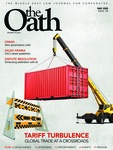DIFC Courts Honour GCC Justice
THE DIFC Courts, the English language, common law judicial system based in Dubai, recently made a legal landmark – after its first enforcement under the Protocol on Enforcement of Judgments, Letters Regulatory and Judicial Notices issued by the Courts of the Member States of the Arab Gulf Co-operation Council (GCC Protocol). The Protocol outlines a commitment by all Gulf states to enforce each other’s judgments in their respective markets when a case requires.
It is widely acknowledged that one of the key reasons a commercial dispute may be directed to the DIFC Courts, rather than other English language, common law courts outside of the region, is the DIFC Courts’ access to the special enforcement powers in place throughout the Gulf, guaranteed by arrangements such as the GCC Protocol, making this a milestone occasion for the Courts.
The Protocol likewise requires that the DIFC Courts assures the execution of other GCC courts’ judgments where necessary. The application for an order in this first international enforcement case was made to the DIFC Courts by the beneficiary of a judgment made by the Ministry of Justice and Islamic Affairs in Bahrain, concerning access to accounts at two DIFC banks. The DIFC Courts has issued an Execution Order to enforce the Bahrain judgment in the DIFC following a review of the Rules of the DIFC Courts, the Riyadh Convention and the 1995 GCC Protocol on the Enforcement of Judgments.
H.E. Justice Ali Al Madhani said: “The significance of this first cross-border enforcement cannot be underestimated. The true power of DIFC Courts’ jurisdiction extension relies on its ability to enforce international rulings in the UAE and likewise the guarantee that its judgments will be executed efficiently across the region. The DIFC Courts are proud to be a recognised and valued partner in regional enforcement protocols.” Judge Shamlan Al Sawalehi, an enforcement judge in the DIFC Courts continued: “This is an exciting time of many important firsts for the DIFC Courts and its new jurisdiction”.

























































































































